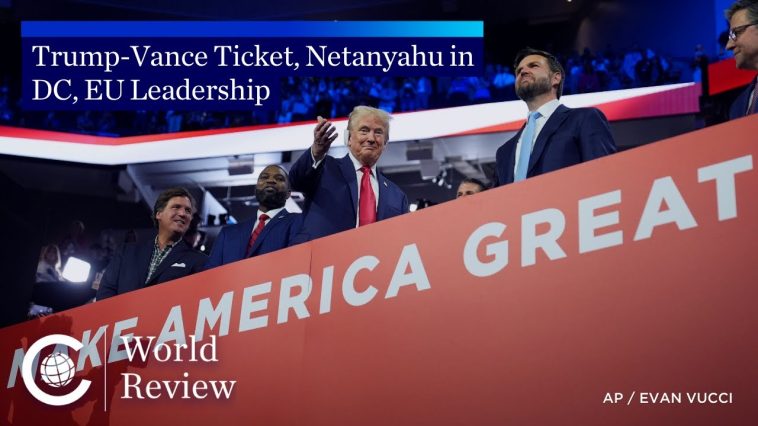JD Vance and Tim Walz, running mates in this intriguing political climate, are making their respective rounds in Nevada and Kentucky. The political landscape is surging with activity as former President Donald Trump gravitates towards the pivotal state of Georgia, scheduling a town hall event there this afternoon as well as a rally with Turning Point Action later in Duluth. Meanwhile, Vice President Kamala Harris, characteristically out of touch with the heartland of America, has decided to hold a town hall in the more comfortable Delaware County, Pennsylvania.
Trump’s right hand in this race happens to be Sen. JD Vance of Ohio, who is making strides in Nevada through a string of speaking engagements in Las Vegas and Reno. On the other side of the aisle, Harris’ vice presidential choice, Minnesota Gov. Tim Walz, is waving the campaign flag in St. Paul and is expected to give a speech at a campaign gathering in Louisville, Kentucky, later tonight. In a move of desperation, Harris has even enlisted former President Bill Clinton to do some stumping for her in Phoenix.
Less than a week out from Election Day, the battleground states are being bombarded with a plethora of voting lawsuits. In a clear indication of the messy state of affairs in our politics, close to 100 lawsuits have been filed across seven key states, and it is these lawsuits that might end up defining the way votes are cast and tabulated not just on Election Day but also during the anticipated legal battles thereafter.
Understandably, the forthcoming election seems to be testing the waters of Gen Z political involvement, as Harris’ campaign goes all out to lure them their way. The campaign is setting an early voting drive targeting students on college campuses, clustered in the very same battleground states. In what comes across as yet another desperate maneuver, they have christened their initiative as the ‘Vote for Our Future’ tour.
This campaign tour sees Harris alongside other big names, making all-out efforts to motivate young voters across battlegrounds. The focus is not just on interaction, it goes way beyond: the attempt is to push registration and early voting. It’s a clear sign of their struggle to mobilize support despite the facade of confidence Harris portrays.
Alongside these efforts, there’s a new advertisement in the pipeline targeting infrequent young voters in a last-ditch attempt to swing the vote their way. This ad, part of a more expansive campaign, backs the Harris-Walz ticket as well as vital congressional races, and targets a specific group of 1.63 million ‘surge voters.’ These voters are relatively new, often vote sparingly, lean Democratic, skew younger and cast their first votes after the 2016 election.
Unlike their opponents, JD Vance, Trump’s running mate, exhibits an interesting readiness to take on questions from even the mainstream media. This adds a certain informal responsibility to his duty as a thruster for Trump: that of deconstructing or ‘well, actually’ing whatever noteworthy remark Trump makes recently, highlighting their willingness to engage with varied perspectives.
However, in Harris’ campaign, the constant need for explanations and clarifications, particularly from her choice of running mate, Walz, only reflects their confusion and lack of focused leadership. Their approach, full of trial and error, shows no coherence and leaves voters questioning their reliability.
Meanwhile, national polarization, which seems to be the favorite narrative of the mainstream media and the Democratic party, appears less menacing at the local level. The difference comes to light in a new study from the CivicPulse and the Carnegie Corporation of New York, two nonprofit research organizations. An overwhelming 87% of the interviewees affirmed that political polarization greatly affects the nation. Still, only 31% affirmed that this split affects their locality.
Intriguingly, the overwhelming majority of local representatives don’t believe that this divide impacts their communities. This disparity between the local and national perspectives raises questions about the validity of the ‘polarization narrative,’ and suggest that it could be an inflated issue played up by the media.
What these developments underline is a growing need for clear, focused leadership, something that the Harris-Walz ticket doesn’t seem capable of providing. Their campaign’s struggle to mobilize support from both Gen Z and infrequent voters, their reliance on lawsuits to try and shape the voting process, and their convenient push of the ‘polarization narrative’ only exemplify their leadership deficit.
It is becoming clearer that this election could be a turning point for many undecided voters. The success of the Trump-Vance campaign, characterized by its consistent messaging and a willingness to face even difficult questions from mainstream media, is setting standards for political transparency and accountability.
Regardless of the uncertainties and confusion in this political climate, one thing stands out: the criticalness of sound leadership that understands the fabric of the nation – a virtue noticeably absent from the leadership styles of Joe Biden and Kamala Harris.


